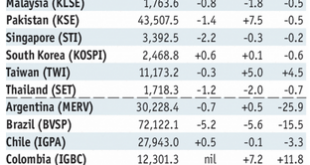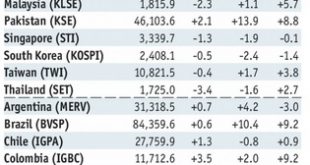SWIFT, the international financial messaging system, has responded to the U.S. sanctions threat (see this post)—it has agreed to comply. Michael Peel reports in the FT, that SWIFT suspends certain Iranian banks’ access to its cross border-payment network. According to Peel, SWIFT explains the step as follows: “This step, while regrettable, has been taken in the interest of the stability and integrity of the wider global financial system.” This does not only expose SWIFT to punitive...
Read More »SWIFT’s Response to the U.S. Iran Sanctions Threat
SWIFT, the international financial messaging system, has responded to the U.S. sanctions threat (see this post)—it has agreed to comply. Michael Peel reports in the FT, that SWIFT suspends certain Iranian banks’ access to its cross border-payment network. According to Peel, SWIFT explains the step as follows: “This step, while regrettable, has been taken in the interest of the stability and integrity of the wider global financial system.” This does not only expose SWIFT to punitive...
Read More »U.S. Sanctions against Iranian Authorities and Other Persons
The Executive Order. And what it means, according to the Treasury Department’s FAQs page (my coloring): E.O. 13846 reimposes relevant blocking sanctions, correspondent and payable-through account sanctions, and menu-based sanctions previously provided for in E.O.s 13574, 13590, 13622, and 13645, which were revoked by E.O. 13716, and continues in effect sanctions authorities provided for in E.O.s 13628 and 13716. As incorporated into E.O. 13846, these measures include implementing...
Read More »U.S. Sanctions against Iranian Authorities and Other Persons
The Executive Order. And what it means, according to the Treasury Department’s FAQs page (my coloring): E.O. 13846 reimposes relevant blocking sanctions, correspondent and payable-through account sanctions, and menu-based sanctions previously provided for in E.O.s 13574, 13590, 13622, and 13645, which were revoked by E.O. 13716, and continues in effect sanctions authorities provided for in E.O.s 13628 and 13716. As incorporated into E.O. 13846, these measures include implementing...
Read More »Germany, or the Bundesbank Caves In
In the FAZ, Philip Plickert reports that Deutsche Bundesbank changed its terms of business. Starting August 25, the Bundesbank may refuse cash transactions with a bank if the Bundesbank fears that, counter to the bank’s assurances, the cash transaction might help the bank or its customers evade sanctions or restrictions with the aim to impede money laundering or terrorism finance. Conveniently, this will allow the Bundesbank to reject a request by European-Iranian Handelsbank to withdraw...
Read More »Germany, or the Bundesbank Caves In
In the FAZ, Philip Plickert reports that Deutsche Bundesbank changed its terms of business. Starting August 25, the Bundesbank may refuse cash transactions with a bank if the Bundesbank fears that, counter to the bank’s assurances, the cash transaction might help the bank or its customers evade sanctions or restrictions with the aim to impede money laundering or terrorism finance. Conveniently, this will allow the Bundesbank to reject a request by European-Iranian Handelsbank to withdraw...
Read More »Emerging Markets: What Changed
Summary US-China trade tensions are rising. Pakistan devalued the rupee for a third time since December. Bulgaria will seek to join the eurozone banking union and ERM-2 simultaneously. The National Bank of Hungary appears to have tilted more hawkish. Newly elected Egyptian President El-Sisi shuffled his cabinet. Argentina has a new central bank chief after Federico Sturzenegger resigned. Chile central bank signaled...
Read More »Emerging Markets: What Changed
Summary Reserve Bank of India cut its inflation forecast for the first half of FY2018/19 to 4.7-5.1%. Former South Korean President Park was sentenced to 24 years in prison. Malaysia Prime Minister Razak has called for early elections. Bahrain discovered its biggest oil field since it started producing crude in 1932. Local press reports Turkey’s Deputy Prime Minister Simsek tendered his resignation. Brazilian Supreme...
Read More »U.S. Tax Enforcement and Offshore Accounts
In an NBER working paper, Niels Johannesen, Patrick Langetieg, Daniel Reck, Max Risch, and Joel Slemrod discuss the effects of recent U.S. tax enforcement initiatives on tax compliance. They offer background information about U.S. initiatives since 2009 and conclude, based on administrative microdata, that [e]nforcement caused approximately 60,000 individuals to disclose offshore accounts with a combined value of around $120 billion. Most disclosures happened outside offshore voluntary...
Read More »Inequality in the United States
… meanwhile, inequality in the US remains more of an issue. On Alphaville, Kadhim Shubber summarizes a DB Global Markets Research study on US inequality: More than 30% of US households have zero or negative non-home wealth. Wealth is increasingly concentrated among the old, and among the wealthy. Observers paint the picture of an increasingly dysfunctional society. And they point to the relevance of inequality for political polarization and accountability.
Read More » Swiss Economicblogs.org
Swiss Economicblogs.org


